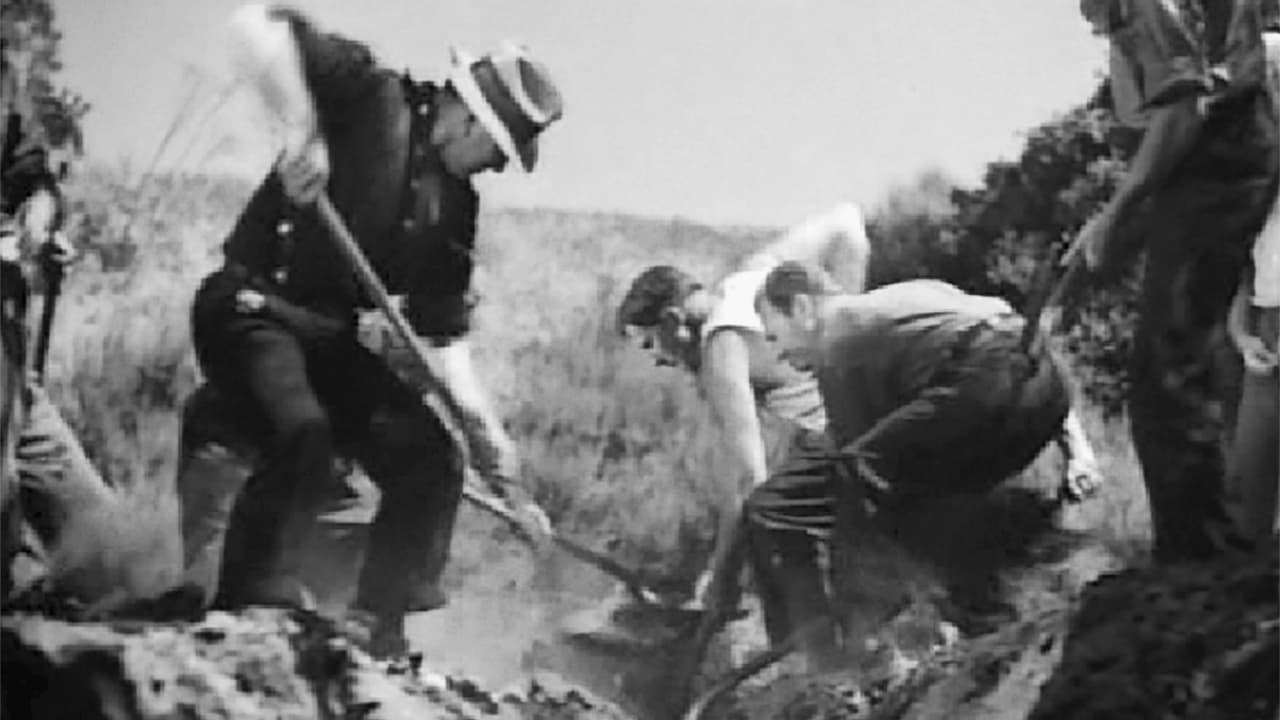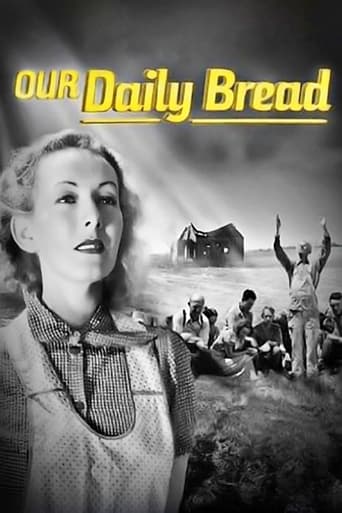Spoonixel
Amateur movie with Big budget
WillSushyMedia
This movie was so-so. It had it's moments, but wasn't the greatest.
Robert Joyner
The plot isn't so bad, but the pace of storytelling is too slow which makes people bored. Certain moments are so obvious and unnecessary for the main plot. I would've fast-forwarded those moments if it was an online streaming. The ending looks like implying a sequel, not sure if this movie will get one
Derry Herrera
Not sure how, but this is easily one of the best movies all summer. Multiple levels of funny, never takes itself seriously, super colorful, and creative.
atlasmb
"Our Daily Bread" is a depression era film about some who suffered but banded together to survive on a communal farm. The effort is led by John Sims who needs the exhortations of his wife, Mary, to keep his spirits up and his mind in the game.The group faces numerous setbacks and trials, but they always manage to persevere. It's a solid portrayal of a communal effort, where every man is his neighbor's brother and some "sacrifice" for the benefit of the many.In the midst of this community arrives Sally, a platinum blonde who fits in like chewing gum on the bottom of a shoe. She provides color, and agitation to the order of the farm. John seems to like her outlook on life.The acting is mostly good, and the plot is dramatic, if somewhat predictable. Other reviewers have cited the ending as the best part of the movie. I disagree, because the ending is so unrealistic (for many reasons) as to take the viewer out of the film. But I understand the intent. A reviewer commented that it reminded him of the "Hey, gang, let's put on a show" device and I was thinking the same thing. Unfortunately, this "show" is more fairy tale than drama.
Steffi_P
Hollywood in the 1930s was a great era for collaboration, under the steady guidance of the studio system. It wasn't an age in which independent filmmakers could thrive, but by and large they didn't need to since studio output was of such high calibre. And yet, there were still times when producers and directors had such a burning desire to get a project off the ground that they just had to strike out on their own. The director, producer and indeed the writer of Our Daily Bread is King Vidor, a man of such good sense, knowledge and professionalism that he was able to make a picture that is head and shoulders above the typical indy feature.With neither studio backing nor stacks of cash, Vidor couldn't get the perfect set-up. Most of the cast are bit players or B-movie stars, so they are a rough bunch, but nevertheless carefully chosen. Lead man Tom Keene I have only seen in one other lead role, and that is in the DeMille silent The Godless Girl, where he is billed under his birth name of George Duryea. Like many silent stars his career dwindled but never quite fizzled out. His voice and manner bear more than a passing resemblance to James Stewart. He doesn't have half the talent, but he has that same honest charm and boyish enthusiasm. He really comes into his own when making a speech and whipping up the crowd – close your eyes in those scenes and you could almost believe it was Jimmy himself. Karen Morley was a fairly prominent character actress, and while she is not outstanding she is not conspicuously bad. Barbara Pepper fulfils the typical bad girl role, and isn't really required to have any more dimension than that. Addison Richards is a little wooden but certainly has presence. And John Qualen is always entertaining, and he proves himself fully able to expand his silly Swede persona beyond a mere comic relief caricature.And Vidor was lucky with his collaborators. As well as securing the services of a competent technical crew, he managed to get nine-times Oscar winner Alfred Newman, before he became Fox's in-house composer and was just a jobbing musical director. Newman's score for Our Daily Bread is delicately touching in a way that film music rarely was, and the massive orchestral finale he provides gives the picture a truly symphonic feel. It is clear the composer absolutely understood the necessary tone, and he is undoubtedly the most crucial contributor after Vidor.But what about Vidor himself? As always his work is supremely beautiful, and he directs with both heart and head. He begins the picture with cramped interiors, with little space between camera, players and the back wall. In the earliest scenes on the farm the space is still not properly opened out – the camera tends to point towards the ground and trees block the horizon. Only when the commune is established and the land cultivated are we hit with the full majesty of the outdoors. These are typical Vidor shots – sublime, sweeping, almost surreal landscapes that seem to call to something deep within us. As the picture progresses we move from straightforward realism into cinematic fantasy, with montages, aesthetic imagery and an increasingly prominent musical presence.I haven't yet touched on why Vidor – a respected industry insider with a healthy career at MGM – had to do Our Daily Bread off his own bat. It was of course too politically controversial at the time for the majors to consider. It's a shame he couldn't have done it with studio backing, and that it was virtually ignored in its day. And yet such is Vidor's determination he has pulled off a production that may not be entirely smooth but at least has no gaping flaws. And as for the politics, whether or not it represents a crazy dream or an attainable paradise, Our Daily Bread's appeal should be universal, because it is above all else a stirring and evocative paean to human endeavour.
Neil Doyle
TOM KEENE and KAREN MORLEY are the lesser-known stars of this Depression-era classic, a poor man's "Grapes of Wrath", about a young farming couple who use ingenuity to overcome a drought that threatens to ruin their crops.Tom Keene was a B-actor who did mostly westerns and does a sincere, earnest job of playing the kind of "everyman" role that Henry Fonda and Joel McCrea usually played in these sort of films. While he has a limited range, he makes an appealing hero, a man who fires others with his ambitious idea to build a gully for the water to reach the crops that are badly in need of water. It's this sequence, with the men following orders and digging the ditches that make a pathway for the water, that really makes the film special.Otherwise, it's a rather drab exercise in showing the downtrodden lives of farming people during the Great Depression of the '30s.KAREN MORLEY is lovely as the loyal woman who stands by her man and JOHN QUALEN does an effective job as a frustrated farmer. Some striking scenes for the last half-hour, but a bit heavy going before that.
mstomaso
King Vidor's Our Daily Bread, served up the basic ingredients of a good life to the audiences of the Great Depression - people for whom all hope seemed lost. * Land* Water* Hard work* Ingenuity* Community and * A positive attitude. Kate Morley is charming and lovely as Mary - the steadfast wife of John Sims (Tom Keene). Tom is a man with good ideas and bad luck. Somewhat mercurial, however, Tom is easily discouraged by his frustrations in trying to find a job. One night an uncle comes to dine at Tom and Mary's apartment and offers Tom and Mary a farm which he can no longer pay for. From this new start, the young couple learns how to farm, how to lead, and what the meaning of community is. While the film is not overtly political, it carries an important political and ethical message - never lose sight of the basics. This message is as important for today's top-heavy economy as it was in the 1930s. Particularly inspirational to me was the character of Mary Sims. Assertive when she needed to be, Mary formed the backbone of her family and, by extension, her entire community. Character actors Addison Richards and John Qualen are also memorable as major benefactors of the farm. Keene is not the best leading man of his time, but, in general, the film is well-acted. The characters are interesting, well-written, and fairly consistent. The cinematography and choreography of the work scenes are excellent - they really make you want to work!Recommended!

